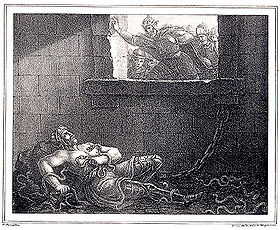
Krákumál
Encyclopedia

Monologue
In theatre, a monologue is a speech presented by a single character, most often to express their thoughts aloud, though sometimes also to directly address another character or the audience. Monologues are common across the range of dramatic media...
in which Ragnar Lodbrok
Ragnar Lodbrok
Ragnar Lodbrok was a Norse legendary hero from the Viking Age who was thoroughly reshaped in Old Norse poetry and legendary sagas.-Life as recorded in the sagas:...
is dying in Ælla
Aelle II of Northumbria
Ælla was king of Northumbria in the middle of the 9th century. Sources on Northumbrian history in this period are limited. Ælla's descent is not known and the dating of his reign is problematic. He is a major character in the saga Ragnarssona þáttr .-Chronicles:Ælla became king after Osberht was...
's snake pit and looks back at a life full of heroic deeds. It was composed in the 12th century, "almost certainly" in the Scottish islands. It is composed in a kind of háttlausa with stanzas of ten lines.
In moving and forceful language, the poem deals with the joys of the life of a warrior, the hope that his death will be followed by a gory revenge, and the knowledge that he will soon know the pleasures of Valhalla
Valhalla
In Norse mythology, Valhalla is a majestic, enormous hall located in Asgard, ruled over by the god Odin. Chosen by Odin, half of those that die in combat travel to Valhalla upon death, led by valkyries, while the other half go to the goddess Freyja's field Fólkvangr...
.
Translation
The poem has been translated into several languages and it has contributed to the modern image of a Viking warrior.Excerpt:
|
|
Primary sources
- Krákumál in Old Norse from «Kulturformidlingen norrøne tekster og kvad» Norway.
- Nordisk familjebok on Krákumál
- Haukur Þorgeirsson on the poem with a recording

